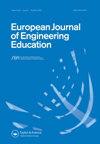Game-based learning apps in engineering education: requirements, design and reception among students
IF 2.8
Q2 EDUCATION & EDUCATIONAL RESEARCH
引用次数: 1
Abstract
There is a lack of research on how game-based learning apps should be designed for engineering education. This paper addresses two research questions: What do engineering students expect from a learning app? Which educational approach and learning app design can meet these requirements? A survey revealed the particular demands of engineering students when using learning apps. They prefer apps that promote transfer of learning. They value a diversified game environment that leaves room for self-determined decisions. They want to use learning apps during five-minute breaks or on-the-go. Social interaction is only of minor importance. Concrete design and content guidelines are derived. Perceptual learning is an appropriate educational approach to meet the requirements. Two universally applicable task types for engineering education are discussed. A case study was conducted to investigate their use in practice. Following the guidelines, an app for heat-and-mass-transfer was generated and its impact on teaching was evaluated. Students considered that their requirements were met. This is reflected in the usage statistics: During one semester, 545 different students played a total of 27,350 games. As a measure of learning progress, the average score per game almost tripled. Apps that follow the guidelines have the potential to become well-accepted learning tools.工程教育中基于游戏的学习应用程序:需求、设计和学生接受度
对于工程教育应该如何设计基于游戏的学习应用程序,缺乏研究。本文解决了两个研究问题:工科学生对学习应用程序的期望是什么?哪种教育方法和学习应用程序设计可以满足这些要求?一项调查揭示了工科学生在使用学习应用程序时的特殊需求。他们更喜欢促进学习转移的应用程序。他们重视多样化的游戏环境,为自己的决定留出空间。他们希望在五分钟的休息时间或在旅途中使用学习应用程序。社交只是次要的。导出了具体的设计和内容指南。感知学习是满足要求的一种适当的教育方法。讨论了工程教育中两种普遍适用的任务类型。进行了一项案例研究,以调查它们在实践中的使用情况。根据指导方针,生成了一个传热传质应用程序,并对其对教学的影响进行了评估。学生们认为他们的要求得到了满足。这反映在使用统计数据中:在一个学期里,545名不同的学生总共玩了27350个游戏。作为衡量学习进度的指标,每场比赛的平均得分几乎增加了两倍。遵循指南的应用程序有可能成为公认的学习工具。
本文章由计算机程序翻译,如有差异,请以英文原文为准。
求助全文
约1分钟内获得全文
求助全文
来源期刊

European Journal of Engineering Education
EDUCATION & EDUCATIONAL RESEARCH-
CiteScore
7.30
自引率
13.00%
发文量
64
期刊介绍:
European Journal of Engineering Education is published six times a year in print and electronic editions and provides an essential forum for dialogue between researchers and specialists in the field of engineering education, at European and worldwide levels. European Journal of Engineering Education is the Official Journal of SEFI, the Socièté Européenne pour la Formation des Ingénieurs (the European Society for Engineering Education). SEFI is a non-governmental organization whose aims are to develop information about engineering education, to improve communication and exchange between professors, researchers and students and to promote cooperation between the various institutions concerned with engineering education.
 求助内容:
求助内容: 应助结果提醒方式:
应助结果提醒方式:


